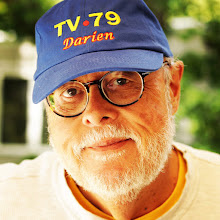Bulldog - Part 1: Aaron Brown on TV News
BULLDOG: Part One
The Bulldog Reporter’s annual Media Relations seminar was held in NYC April 9-11, 206. In addition to leading two workshops, I attended some very interesting panels. Here’s the first of my reports.
-----------------------------------------------------------
Since his program was cancelled on CNN last summer, Aaron Brown has had lots of time on his hands.
He’s used it to bond with his soon –to-be college-bound daughter, to cook, build a new home in Arizona, “play a little golf”… and to think about the state of his industry. He shared his comments in a pithy, thoughtful keynote address at the Bulldog Media Relations seminar in New York City on April 10th.
“I am privileged beyond belief,” he said of his tenure in network news. “But life is way too short to be upset by the natural course of events,” speaking of his layoff from CNN. “I’m still getting paid,” he added with a smile.
He reminded the audience that he was in good company in his current dilemma, naming anchors from Howard K Smith to Walter Cronkite who had also been laid off during their careers.
Does your mind go to jelly when you’re not working, he was asked? “I work in TV news. That happened long ago,” he responded, adding that “I’m in a good state, far better than having high blood pressure.”
Among the “lessons” he’s learned…
Ø “Immediate does not always mean important. None of us got in this business to keep chasing the ‘runaway bride’. We were drawn to journalism by big events,” telling how he watched Cronkite’s coverage of the JFK assassination and recounting that it was then that he knew his career goal. “(Viewers) come to anchors in major moments of crisis because they know and trust them. (They’re) scared, and we don’t want to be alone.”
Ø The major networks have finished their generational transition, from Tom, Dan and Peter to the younger anchors. “These replacements are all good, smart and capable… but yet to be tested in moments of crisis.” How will Katie Couric do at CBS? “Great. But the question is how audiences will transition from a ‘goofy morning show’ to something more serious. Brokaw made that switch. The question isn’t how Katie will do, but that she did (take up the challenge).” Brown added that, while the senior anchors also had clout within their news organizations, he’s not so sure this new group will be as well connected and respected internally… or if they’ll be heard.
Ø On the increasing entertainment nature of TV news, Brown said viewers get what they deserve. “If Frontline drew a 28 share it would be on every night. I just wish we could lower the volume of discourse. We get good TV news because we demand it. (What we need to do is) reject those who engage in incivility and not tune it in just for the fun of it.”
Ø Asked about the pressure of ratings Brown admitted that they do matter. “ABC used to measure audience by minute by minute, but that was a bit much”. But he almost agreed with his old ABC boss Rick Kaplan who said that those who use Tivo and don’t watch commercials are, in effect, “stealing”. Brown said that when his daughter was three, she complained about the commercial interrupting her favorite shows. “Gabby, I said… in this household we LOVE commercials.” That business model won’t change, he somewhat lamented.
Ø The audiences have changed. These days “people only want to hear what they already believe. Tell them something different and they scream bias. The joy of democracy,” he said, “should come from learning from others’ points of view. (But) TV is a democracy and we vote with our remote controls.”
Ø In a climate of scandal in the journalism world, reporters have “gone woozy”, losing that characteristic “strut” they learned in J-school. “They’ve become gun-shy, confusing balance with fairness.” Brown says when C-Span did an interview with the author of a book on the holocaust they felt obliged to also interview a holocaust denier. Brown says that, after the invasion of Iraq there was too much discussion of a proven fallacy..,. that there were weapons of mass destruction in Iraq.” “If you were doing a segment on NASA would you feel obliged to interview someone who says the earth is flat? “There is no doubt that global warming is underway. We should debate its implications and its effects on the economy… not give airtime to arguments that it doesn’t really exist. That shouldn’t be up for debate.”
Asked about anticipated coverage of the Duke University lacrosse team sex scandal, Brown said it was an interesting story, not from the sex angle but because of the race issue. “Race is the most uncomfortable communications issue we have today,” adding that while he wouldn’t predict OJ-style, never-ending coverage, he did forecast that “broadcasters will do what the market wants them to do.”
###


0 Comments:
Post a Comment
Subscribe to Post Comments [Atom]
<< Home